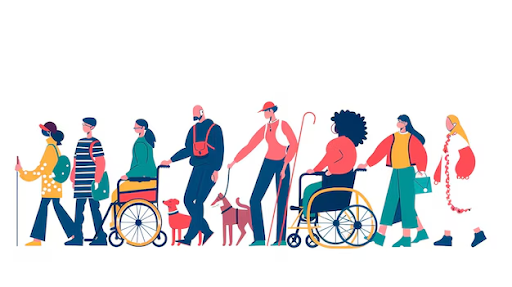Navigating social interactions can sometimes feel challenging, especially when you want to ensure that your actions and words are respectful and supportive. When it comes to interacting with people with disabilities, a little awareness and sensitivity can go a long way. Here’s a guide to help you engage in a manner that is both considerate and empowering.
1. Use Person-First LanguageOne of the simplest yet most impactful ways to show respect is by using person-first language. This means putting the person before their disability, such as saying “a person with a disability” rather than “a disabled person.” This emphasizes their humanity first, rather than defining them by their disability.
2. Ask Before Helping
It’s natural to want to assist someone who appears to be struggling, but always ask before jumping in. Offer your help and wait for a response. For example, you might say, “Would you like any assistance?” Respect their decision if they decline; autonomy is important.
3. Respect Personal Space and Equipment
Personal space extends to mobility aids and other assistive devices. Refrain from touching or moving someone’s wheelchair, cane, or any other equipment without permission. These aids are considered an extension of their personal space and autonomy.
4. Communicate Directly
When interacting with someone who has a disability, speak directly to them rather than to a companion or interpreter. This shows respect and acknowledges their presence. Use a normal tone of voice unless the person indicates they have hearing difficulties.
5. Be Patient and Listen
Effective communication sometimes requires patience. If someone has a speech impairment, listen attentively without interrupting. If you don’t understand something, it’s perfectly okay to ask them to repeat it. Showing patience and a willingness to understand is greatly appreciated. .
6. Avoid Making Assumptions
Everyone’s abilities and preferences are unique. Avoid making assumptions about what someone can or cannot do based on their appearance or their disability. Instead, take your cues from the individual and their actions.
6. Avoid Making Assumptions
Everyone’s abilities and preferences are unique. Avoid making assumptions about what someone can or cannot do based on their appearance or their disability. Instead, take your cues from the individual and their actions.
7. Use Appropriate Terminology
Language around disabilities can evolve, and it’s important to stay informed about the preferred terminology. If you’re unsure, it’s okay to ask the person what terms they prefer. Using the right words shows respect and an effort to understand.
8. Be Mindful of Your Body Language
Body language can convey respect or disrespect. For example, if you’re talking to someone in a wheelchair, try to sit or crouch to be at eye level, if possible. This makes the interaction more comfortable and equal.
9. Celebrate Abilities, Not Disabilities
While it’s important to recognize the challenges that people with disabilities may face, it’s equally important to celebrate their abilities and accomplishments. Focus on what they can do rather than what they can’t.
10. Promote Inclusivity
Inclusivity goes beyond individual interactions. Advocate for accessible environments and inclusive policies in your community. Support businesses and organizations that prioritize disability inclusion.
By incorporating these guidelines into your interactions, you can help create a more inclusive and respectful environment for everyone. Remember, it’s about treating people with the dignity and respect they deserve, regardless of their abilities. Let’s move beyond awareness and towards genuine inclusion, one respectful interaction at a time.
Join us in this meaningful journey towards a society where everyone is included. Together, we can unlock opportunities and build a future where everyone has equal access and the chance to thrive.
To register with us for Workshops, visit the link: https://giftabled.sg/contact-us/

